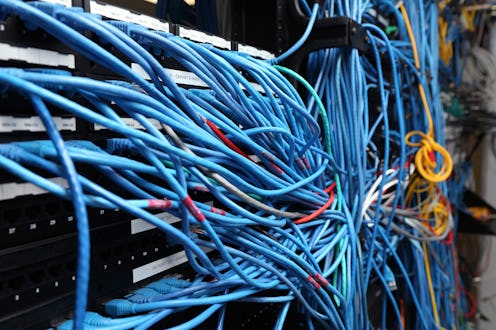News
Trump's New FCC Rules Will Actually Break The Internet

In a reversal of Obama-era rules, the chairman of the Federal Communications Commission announced plans to gut net neutrality on Tuesday. The current rules prevent internet service providers (ISPs) from giving preference to certain types of traffic, guaranteeing that everyone has equal access to the internet. Repealing those rules would mean telecommunications companies could block or slow down certain content — and charge you more for accessing that content, too.
Under Obama, the FCC decided to treat the internet like a phone connection or electricity, which are public utilities that everyone needs. Those rules, which acknowledged that the internet is essential and not a luxury, were upheld in federal court in 2016. The courts declined a rehearing of the case in May.
But the FCC's new chairman, Trump appointee Ajit Pai, wants to go back to classifying broadband as an "information service," which makes regulation harder and benefits internet service providers, like Comcast or AT&T, at the expense of content providers, like Google and Netflix.
Yosef Getachew, a policy fellow at Public Knowledge, tells Bustle that the current rules allow you to access all of the web equally, at the same speed, and without paying more for that access. Public Knowledge promotes policy that includes an open internet, freedom of expression, and access to affordable communication tools. Getachew explains:
The consumer has the ultimate choice for what they want to do, what they want to see, and how they want to interact online. What we'll be seeing shortly is that the FCC will be repealing its rules, where an internet service provider could block a consumer from accessing a website, or throttling their access or forcing them to pick and choose which websites they go to.
The current administration sees things differently, describing the net neutrality rollback as a return "to the bipartisan, light-touch regulatory framework under which a free and open internet flourished for almost 20 years." The FCC website also says that the changes seek "to advance the FCC's critical work to promote broadband deployment in rural America and infrastructure investment throughout the nation, to brighten the future of innovation both within networks and at their edge, and to close the digital divide."
But real concerns for everyday internet users remain, Getachew says. Since the dawn of the world wide web, the options for users have grown in huge ways. For example, 15 years ago people were limited to just a few email providers; Yahoo and AOL competed with the accounts that ISPs offered, resulting in email addresses at domains like iowatelecom.net for many Americans. Today, many people have moved to services like Gmail. With the repeal of net neutrality rules, startups would have a much harder time breaking into the market.
"The internet has grown so much that it's not just one or two players. It's several players, small businesses, startups and it's brick-and mortar companies that are operating online in some capacity," Getachew says. "When the internet has grown so much, we need to create a level playing field to give everyone equal access and an equal opportunity to reach consumers."
Pai's announcement has been several months in the making. Back in May, he announced that the FCC would be open to public comment on the previously settled matter. That led to an uproar from open internet advocates and celebrities like HBO host John Oliver. He bought the website GoFCCYourself.com to drive people to leave a public comment in favor of the rules, leading the government agency's website to briefly crash.
It would seem such efforts have failed as Pai's announcement will come later on Tuesday. And protesting against the move could grow harder too. "If an ISP did not approve of a protest, it could very well just block that platform, or charge a company like Twitter a lot more to prioritize that content," Getachew says.